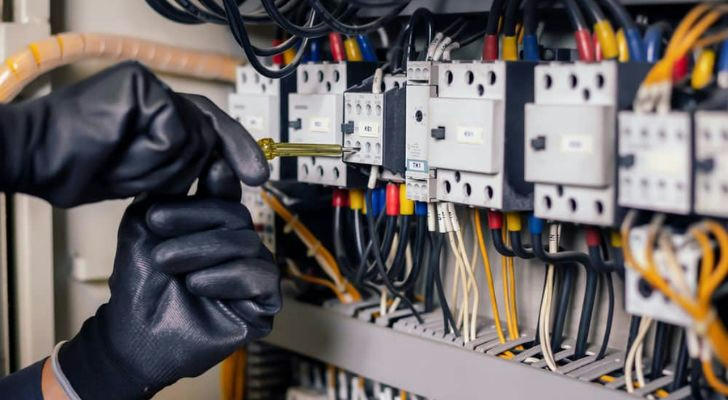Electrical Work: Navigating Challenges and Embracing Opportunities
Introduction
Choosing a career as an electrician provides the chance to engage with critical infrastructure and technology. This profession is vital for maintaining and installing electrical systems in residential, commercial, and industrial settings. The stability of demand, the variety of work environments, and the satisfaction of ensuring safe and functional electrical systems make this career both rewarding and dynamic.

Main Challenges of Electrical Work and Solutions:
- Technical Complexity
Advanced Knowledge Required: Electricians must understand complex electrical systems, circuitry, and safety standards, which requires extensive training and knowledge.
Solution: Pursue comprehensive training and certification programs to build a strong technical foundation. Stay updated with industry advancements and continue learning about new technologies and practices.
Problem-Solving Skills: Diagnosing electrical issues and troubleshooting requires sharp problem-solving abilities.
Solution: Develop strong analytical skills through practical experience and ongoing education. Use diagnostic tools and techniques to enhance your problem-solving efficiency.
- Physical and Safety Demands
Physical Labor: Electrical work often involves climbing ladders, working in confined spaces, and handling heavy equipment, which can be physically demanding.
Solution: Use proper lifting techniques, wear appropriate safety gear, and take regular breaks. Incorporate exercises to build strength and flexibility to handle physical demands.
Safety Hazards: Electricians face risks such as electrical shocks, falls, and exposure to hazardous materials.
Solution: Adhere to strict safety protocols, including wearing protective equipment and following safety guidelines. Participate in regular safety training and risk assessments to minimize hazards.
- Varied Work Environments
Diverse Settings: Electricians work in a range of environments, from residential homes to industrial plants, each with its own set of challenges.
Solution: Adapt to different work environments by gaining versatile skills and understanding specific requirements for each setting. Develop a flexible approach to handle various types of electrical work effectively.
Unpredictable Conditions: Work conditions can vary significantly, affecting job planning and execution.
Solution: Prepare for diverse conditions by equipping yourself with a wide range of tools and materials. Communicate clearly with clients to understand their needs and the specific challenges of each job.
- Client and Project Management
Meeting Expectations: Electricians must meet client expectations for quality work and timely completion.
Solution: Set clear expectations with clients from the beginning and maintain open communication throughout the project. Conduct regular quality checks and seek feedback to ensure satisfaction.
Handling Complaints: Addressing client complaints and resolving issues can be challenging.
Solution: Approach complaints professionally and resolve them promptly. Use feedback as an opportunity to improve your service and build stronger client relationships.
- Regulatory Compliance
Code Requirements: Electrical work is governed by strict codes and regulations to ensure safety and compliance.
Solution: Stay informed about local electrical codes and industry regulations. Participate in continuing education to keep up with changes and ensure compliance in all projects.
- Job Stability and Career Growth
Career Advancement: The electrical profession offers pathways to advance to roles such as electrical supervisor, project manager, or even start your own electrical business.
Solution: Gain experience, pursue additional certifications, and explore leadership opportunities to advance your career. Consider entrepreneurial ventures for greater autonomy and growth.
- Long-Term Physical Impact
Physical Wear and Tear: The physical demands of electrical work can lead to long-term health issues and career fatigue.
Solution: Implement wellness programs, including regular health check-ups and physical fitness routines. Promote a healthy work-life balance to prevent burnout and physical strain.

Opportunities in the Electrical Profession:
- Stable Job Demand
Ongoing Need: The demand for skilled electricians remains robust across various sectors, including residential, commercial, and industrial settings.
Opportunity: Take advantage of stable job prospects by positioning yourself as a skilled professional. Explore opportunities in different sectors to enhance job security.
- Diverse Work Environments
Varied Settings: Electrical work can be found in diverse environments, providing a range of work experiences.
Opportunity: Enjoy the variety and challenges of working in different settings, which can enhance job satisfaction and provide new learning experiences.
- Career Development and Advancement
Skill Diversification: Opportunities exist to advance to roles such as electrical inspector, facilities manager, or start your own electrical business.
Opportunity: Gain experience and pursue additional training to move into higher-level roles or entrepreneurial ventures. Embrace career development opportunities for growth.
- Contribution to Infrastructure
Essential Services: Electricians play a crucial role in maintaining and improving electrical infrastructure, ensuring safe and reliable systems.
Opportunity: Take pride in the significant impact your work has on public safety and infrastructure, enhancing job satisfaction and professional recognition.
- Career Satisfaction
Problem Solving: The satisfaction of resolving complex electrical issues and ensuring functional systems provides a strong sense of accomplishment.
Opportunity: Enjoy the gratification that comes from effectively addressing electrical challenges and improving clients’ safety and comfort.
- Continuous Learning and Growth
Technological Advancements: Stay updated with the latest electrical technologies and techniques.
Opportunity: Engage in continuous learning to remain at the forefront of industry advancements, enhancing your expertise and career prospects.
- Flexible Work Arrangements
Freelance and Contract Work: Opportunities exist to work as a freelance electrician or contractor.
Opportunity: Enjoy greater flexibility in work hours and project selection, providing a better work-life balance.

Are You Ready to Become an Electrician?
Background:
Chen Lei, previously working in a different technical field, sought a career change that combined technical skills with hands-on work. Fascinated by the complexities of electrical systems, he explored electrical work as a new career path.
Decision to Transition:
Chen Lei chose the electrical profession for several reasons:
Passion for Technical Challenges: His interest in working with complex electrical systems drew him to the profession.
Stable Job Demand: He recognized the strong demand for skilled electricians, ensuring job stability.
Career Satisfaction: The opportunity to see the results of his work and ensure functional electrical systems was appealing.
Diverse Work Environments: The variety of work settings offered new challenges and learning opportunities.
Career Growth: The potential for advancement and skill diversification was a motivating factor.
Outcome:
After completing electrical training and certification, Chen Lei successfully transitioned into an electrical career. He now works in various environments, enjoying the stability, diverse work settings, and the satisfaction of solving electrical challenges.
Conclusion:
The electrical profession presents both challenges and opportunities. While it involves technical complexity, physical and safety demands, and variable work conditions, it also offers job stability, career growth, and a significant impact on infrastructure. By addressing the challenges effectively and seizing the available opportunities, individuals can build a rewarding and fulfilling career in electrical work.
